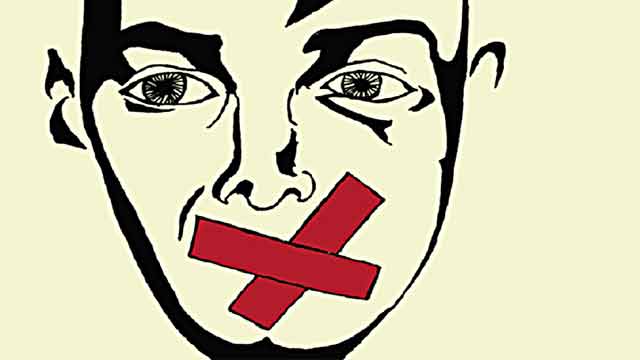The government has established wider control over the online contents through a state of the art technology, installed at the cost of Tk 159 crore, enabling the government to block any online content, including Facebook page or account in just three minutes.
The system was installed under the Cyber Threat Detection and Response project of the department of telecommunications launched in July, 2017.
So far, the government has blocked around 22,000 sites, mostly containing porn and facilitating gabling.
But it could not be known how many Facebook contents or accounts were blocked using the system.
A senior official of the telecom ministry on Wednesday told New Age that the system has the capacity to block any of the online contents, including Facebook account or page.
‘It takes only three minutes to block an online content using this system,’ he said and added that the system has been running in full swing and its operational authority would be handed over to the Bangladesh Telecommunication Regulatory Commission in December this year.
The regulatory commission would operate the system as per the instruction from the government agencies.
The system has ability to monitor 2,700 gigabits per second of data at once while the country’s online usage has reached around 1,200 gigabits per second.
Meanwhile, Facebook accounts of many individuals, especially those who have been critical to the government’s policies, were blocked in the recent times.
For instance, Dhaka University Central Students’ Union vice-president Nurul Haq Nur found his Facebook account disabled on Wednesday.
Haq, who has been critical of the government’s policies recently, tried to log on to his account on Facebook around 11:00am on the day and found it disabled.
The government agencies or the ruling Awami League activists might be behind the disabling of his account, Haq said.
Besides, Facebook accounts of New Age editor Nurul Kabir, Shaptahik editor Golam Mortuza, Chanel-i journalist Zillur Rahman, former Bangladesh Lekhok Oikko president Rakhal Raha, activists Imtiaz Mirza and Rifat Khan were blocked or disabled recently.
Many of the online activists, critical to the government’s politics, now fear Facebook account block.
Anxious over Facebook account and page block, Pinaki Bhattacharya, writer and online activist, on a Facebook post on October 17 this year has requested friends and followers to track his personal domain if his account is blocked too.
Speaking about the capacity of the system, posts and telecommunications minister Mustaf Jabbar told New Age on Wednesday that through the system they were dealing with issues under three criteria — national security, gambling and pornography.
‘Other than these three types of contents, we usually do not interfere,’ he pointed out.
Speaking about the government’s capacity to block Facebook account or pages, the minister also said that there was scope of controlling Facebook contents also, but there was a precondition in doing so.
Jabbar, however, said that the extent of the social media has become so vast that its monitoring and review process have become one of the biggest challenges. But, the ministry has been trying to attain the capacity as well.
Asked whether there was any scope for any appeal against the government move, he said, ‘We have the capacity to unblock content and release any content depending on the explanations of the aggrieved.’
‘Freedom of expression is a constitutional right of the country’s citizens, but in recent times, Facebook and social media have emerged as important tools to express opinions,’ Transparency International Bangladesh executive director Iftekharuzzaman told New Age.
On the other hand, the government has been adopting technique to prevent misuse of social media or online contents, he said, adding, ‘There were allegations that the government was blocking Facebook pages or social media accounts on political grounds.’
‘If the allegations are correct, the authority should refrain from doing so as such activities are a breach of the constitution,’ he said.
On the pros and cons of the system, jurist Shahdeen Malik told New Age, ‘The government can take required measures in the face of any untoward incidents similar to those in Bhola’s Borhanuddin, where four people were killed and over 100 were injured in a clash between police and the locals over a Facebook post that allegedly hurt the religious sentiment of the Muslims, to prevent immediate threat to peace, law and order. But, it is a very rare incident.’
‘Otherwise, the government must show a reason before shutting down any Facebook page, account or anything else as freedom of speech and privacy are constitutional rights of the people,’ said Shahdeen.
Before taking measures like blocking accounts, the government must also clarify what greater societal good would be achieved by the way of taking such measures, he argued.
Apart from using the system, the government has capacity to block any online content or website by issuing instruction to the international internet gateways, which provides bulk bandwidth for public use to internet service providers.
For blocking Facebook pages or accounts, the government can file report to the Facebook authority and almost half of the requests were entertained by the Facebook authority.
In July-December period last year, the government made 149 requests to Facebook involving 195 accounts of its users.
Sources said that none would be able to know the exact reason if any Facebook accounts or pages were blocked by the Facebook authority following requests from the government agencies.
To tighten authority over Facebook, the government has been pressing the social media giant to open an office in the country.
Amid repeated pressure from the government, Facebook, having 3.5 crore users in the country, agreed to appoint a representative for Bangladesh instead of opening its branch office in the country.
The minister had told media in September this year, ‘Facebook used to be very reluctant in responding to our requests for blocking contents. But now they are eager to be in touch with us.’
‘Since we have the technology now, Facebook officials have started lobbying to meet us,’ he said.-New Age





